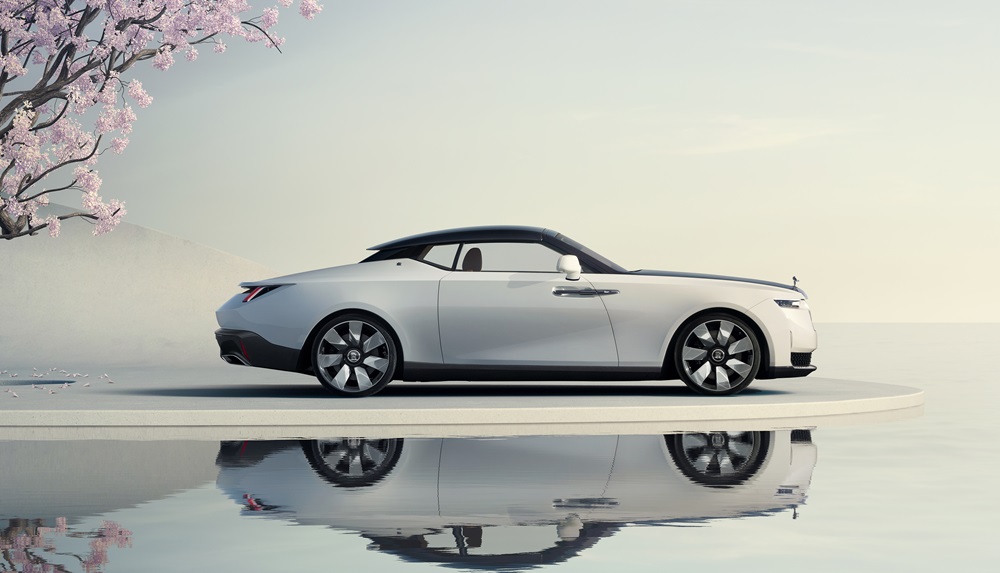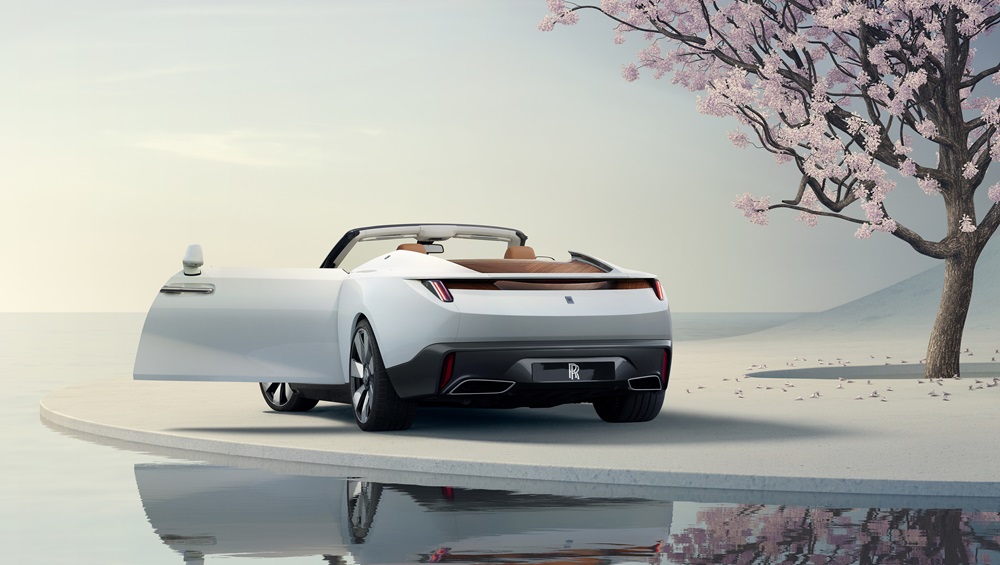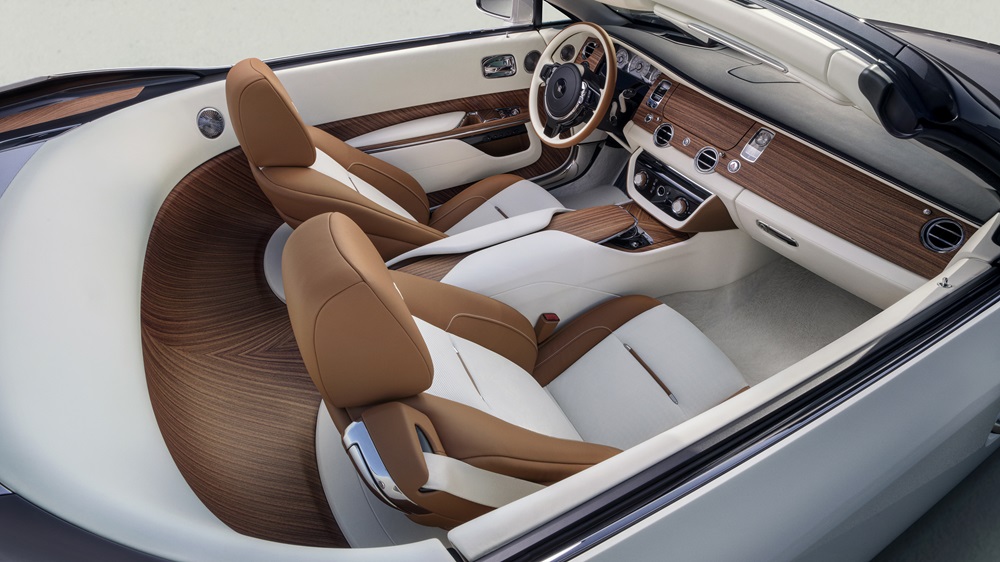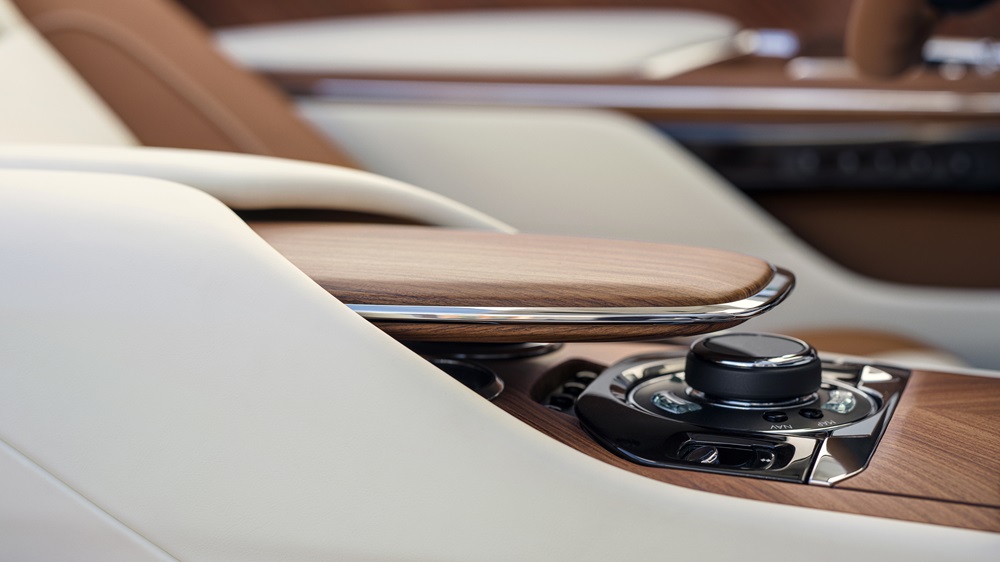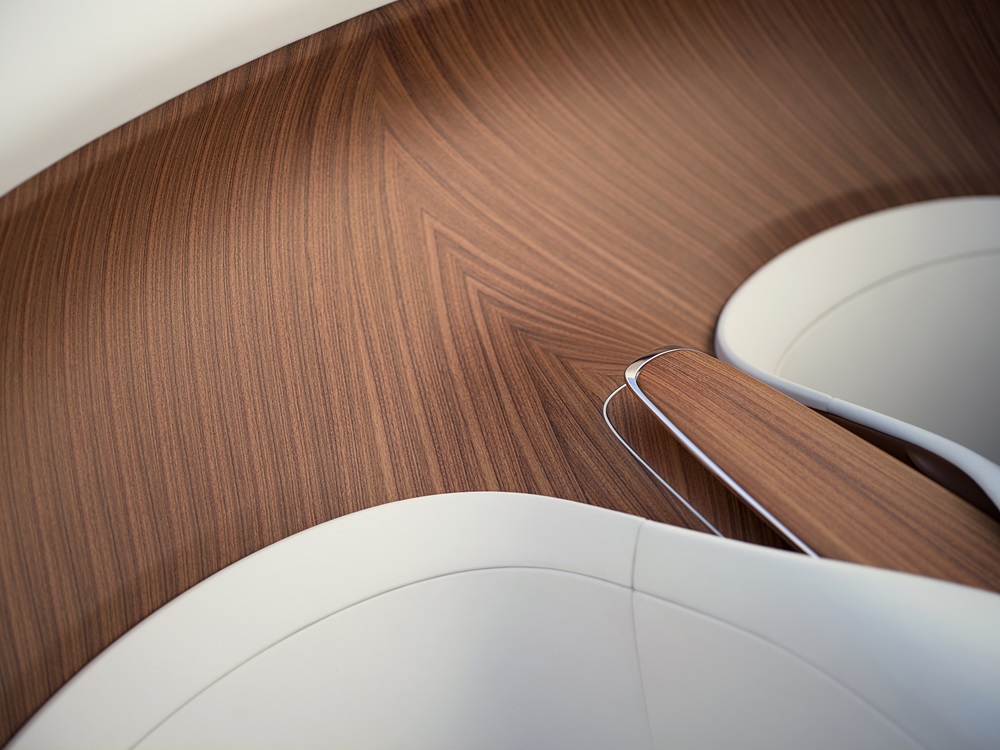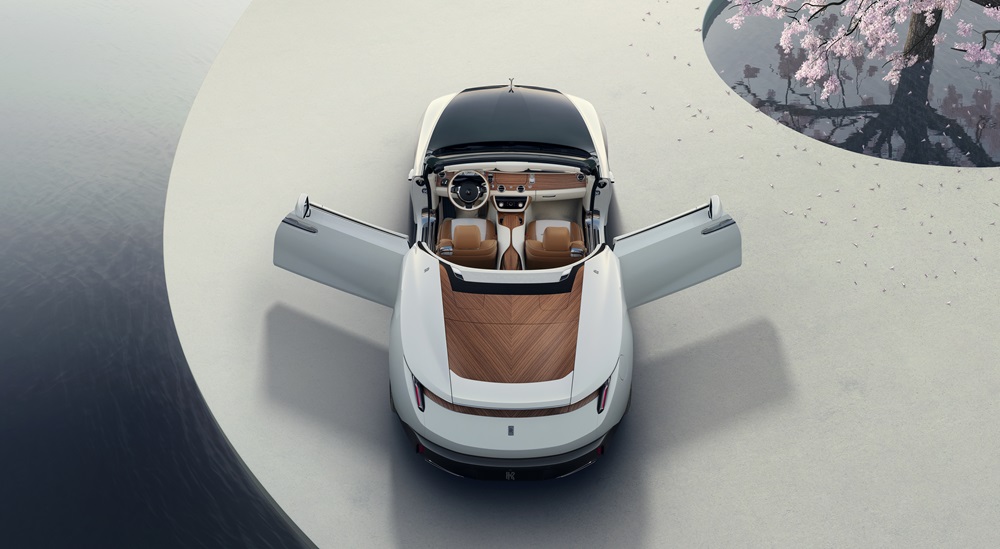Rolls-Royce has presented the Arcadia Droptail, an exquisite coachbuilt expression of tranquillity. The Arcadia Droptail is the epitome of quiet irreverence, celebrating purity of form and natural materials while serving as a bold statement of the client’s personal taste. Commissioned by an individual who possesses a distinct affinity for architecture and design, the Arcadia Droptail is a testimony to the patron’s sensibilities and personal codes of luxury, defined by purity and subtle restraint, reflecting their firm belief in distilling complexity to reveal the inherent, fundamental essence.
This coachbuilt commission takes its
name from the mythical realm of Arcadia, a place depicted in Ancient
Greek mythology as "Heaven on Earth" - a land renowned for its
extraordinary natural beauty and perfect harmony. Like the haven that
inspires its name, the Arcadia Droptail was envisioned by the client as a
serene space characterised by reduction, material depth and tactility
that would serve as a refuge from the complexities of their business
life.
In capturing the theme of tranquillity, Coachbuild
designers embarked on an exploration of design, sculpture and
architecture from the client’s favourite regions around the world. This
included the precision and richness of modernist tropical sky gardens
seen in Singapore, Indonesia and Vietnam as well as British "Biomimetic"
architecture, where organic forms and material honesty are celebrated.
In
addition to these references, the client was also inspired by the motor
car itself and the purity of the Droptail design concept. The
commissioning client insisted that their Coachbuild car should be
absolutely faithful to the earliest hand-drawn sketch they were first
presented with in 2019.
It was the profile of this highly
contemporary projection of the roadster body type that resonated so
strongly with the commissioning client. They were particularly compelled
by the car’s bold, low stance, ensconcing cabin design and dramatic
body lines. They also immediately recognised the nautical inspiration
behind the Droptail’s "sail cowls": named after their resemblance to a
yacht’s jib, these sharp, angular forms rise behind the doors and curve
gently inwards, subtly directing the eye to the car’s occupants.
In order to fulfil the client’s ambition to honour the Droptail’s form, Rolls-Royce Coachbuild designers developed a calm, natural duotone colourway for the car’s coachwork. The client’s aspiration was to define a timeless white, appearing as a solid colour at first glance, but creating a level of intrigue upon further study under natural light. To achieve this, the main body colour is a solid white infused with aluminium and glass particles. This not only creates an effervescent shimmer when the light strikes the coachwork but, upon close inspection, creates the illusion of unending depth in the paint. Rolls-Royce specialists developed a more faceted, striking metallic using larger sizing of aluminium particles. The client was very particular and involved in their request for the Bespoke silver to contrast against the white, not only in colour, but also in terms of intensity.
In a key departure from the other three coachbuilt Droptails in this series, the carbon fibre used to construct the lower sections of the Droptail is painted in the solid Bespoke silver colour rather than left fully or partially exposed, visually "lifting" the car in profile to intensify its lithe, dynamic intent.
In tribute to the brilliant mirror
finish of brightwork on historical Rolls-Royces, which particularly
fascinate the client, the exterior grille surround, "kinked" vane pieces
and 22-inch alloy wheels have been fully mirror-polished.
While
the Arcadia Droptail’s exterior palette is rich in subtle detail, its
primary intention is to celebrate the form and proportions of the
coachwork. The client was particularly compelled by the Droptail’s
clean, monolithic surfacing and bold use of negative sculpture -
features that are amplified by the car’s muted paint colours, which
reflect sunlight and cast dramatic shadows, highlighting the Droptail’s
many subtle design gestures.
As the exterior of the Arcadia Droptail celebrates the car’s form, the interior is a deeply personal reflection of the client’s individual aesthetic, reflective of the style they have curated in their residences and business spaces around the world. The Arcadia Droptail’s colour palette and material treatment was envisioned to be a truly personal statement and instantly recognisable as a personal signature of the commissioning client.
Wood
development was central to the Arcadia Droptail’s interior and the
client’s focus, whose very specific expectations concentrated on the
texture, grain, colour and richness of the material itself. The client
shared many examples of preferences and inspiration from architecture,
residences and classic cars, to guide Rolls-Royce Coachbuild designers
and material specialists.
Santos Straight Grain was eventually
selected as the most modern statement, based upon its rich texture and
visual intrigue, which is derived from its unique, interlocking grain
pattern.
Using this high-density hardwood on the Droptail’s interior posed a significant challenge for the marque’s craftspeople. Santos Straight Grain has one of the finest grain types of all the wood species used within a Rolls-Royce - if not handled with the greatest care, it easily tears when machined and ‘checks’ (a crack that appears parallel to the grain) during the drying process. Despite the challenges of working with this delicate material, Santos Straight Grain is used throughout the Droptail, including the aerodynamically functional rear deck section, where the grain of the open pore veneer is laid at a perfect 55° angle. To achieve a perfect composition over complex geometry, Rolls-Royce artisans used a total of 233 wood pieces throughout the Arcadia Droptail, with 76 pieces applied to the rear deck alone.
Given that Arcadia Droptail will be used internationally,
including some tropical climates, specific attention was paid to
developing a protection system and testing process for the exterior wood
surfaces. Coatings used on superyachts were initially considered but
rejected given that they require regular servicing and re-application.
Instead, a Bespoke lacquer was developed that requires just one
application for the lifetime of the motor car.
To validate this
coating, Rolls-Royce specialists conceived a unique testing protocol
wherein veneer pieces were subject to a punishing cycle inside a
specialist machine simulating global weather extremes. This involved
spraying sample wood pieces with water intermittently, between periods
of leaving them to dry in darkness and exposing them to heat and bright
light.
This was repeated for 1,000 hours on 18 different samples
before the marque’s specialists were satisfied with the endurance of the
pieces. In total, the wood pieces and protective coating required more
than 8,000 hours of development.
The leather interior is finished in two entirely Bespoke hues, named after the client and reserved exclusively for their use. The main leather colour is a Bespoke White hue, continuing the exterior paint theme, while the contrast leather is a Bespoke tan colour, developed to perfectly complement the selected wood.
The interior also includes the exquisite shawl panel that unites all four Droptail cars and is the largest continuous wood section ever seen on a Rolls-Royce car. In the Arcadia Droptail, it is made in the same Santos Straight Grain open pore veneer as the rear deck, book-matched at the same 55° angle, with individually shaped leave stripes running seamlessly into the door linings. CAD tools were used to map the placement of each wood piece, and although it appears to be constructed from just two mirrored sections of veneer, this panel alone is made up of 40 sections, each digitally mapped before being fixed to the car.
Applying wood to the complex curvatures of the Droptail’s interior required Rolls-Royce engineers to develop an entirely new substructure for several components. The dramatic geometry of the dashboard, door linings and central cantilevered ‘plinth’ armrest had to be incredibly rigid to ensure the stability of the wood pieces once they were laid in place. Engineers called on carbon fibre layering techniques used in F1 motor racing to develop an incredibly stiff base onto which the wood could be applied, ensuring that it remained secure regardless of the dynamic extremes the motor car experienced.
The
Santos Straight Grain veneer fascia incorporates a clock conceived and
developed by Rolls-Royce Coachbuild designers and craftspeople. This
expression of haute horlogerie is the most complex Rolls-Royce clock
face ever created: the assembly alone was a five-month process, which
was preceded by more than two years of development.
The clock
incorporates an exquisite geometric guilloché pattern in raw metal with
119 facets. This is a symbolic nod to the marque’s heritage; as the
client first saw a preview of the car in late 2023 - the year when
Rolls-Royce celebrated its 119-year anniversary. The specially designed
clock face also includes partly polished, partly brushed hands and 12
‘chaplets’ - or hour markers - each just 0.1mm thick. To ensure the
readability of the timepiece, specialists gave each chaplet an infill
bridge and painted them by hand using a camera capable of magnifying an
image by up to 100x.
While many haute horlogerie methods were
used to develop the timepiece, the testing and validation standards at
Rolls-Royce are higher than those of the watch world. This required the
marque’s specialists to draw on an expansive palette of materials. For
example, instead of anodizing the timepiece’s minute marker, which is
common practice in watch manufacturing, it is finished in a ceramic
coating chosen because of its stability over time as well as its
aesthetic merits. Small areas of the coating were laser-etched away to
reveal the mirror finish of the aluminium material beneath it. Like
every piece within the timepiece, including the Bespoke ‘double R’
monogram, they were individually machined from solid stainless-steel
billet and polished by hand prior to assembly.
Themes from the
clock are paired with the instrument dials, sharing materials,
techniques and execution. They feature the same repeated guilloché
pattern, as well as brushed and polished brightwork and frosted white
inserts, recalling the colourway of the car.
Reflecting the patron’s international lifestyle, the car is specified with left-hand drive to facilitate its use around the world. This international dimension was so important to the commissioning client that the Coachbuild Collective wanted them to experience the car in multiple locations around the world before it was built. Coachbuild designers used the marque’s ‘holodeck’ to facilitate this - a unique virtual 3D environment in which the client uses an advanced virtual reality (VR) headset to view the car as it would appear in specific locations around the world.
While every Rolls-Royce client is different, they each share a powerful strength of conviction, and this individual’s requirements were clearly stated from the outset. However, translating these complex, highly personal sensibilities into a coherent, workable design was the product of a significant body of work. It was here that the Coachbuild process, with its unprecedented investment of time - over four years in total - and uniquely close relationship between the client and the marque, paid incalculable dividends.
Coachbuild designers invested many months examining and interrogating the client’s tastes in everything from clothes and furnishings to food and travel destinations. From this, they defined and codified an aesthetic rooted in the client’s truth and experience; an objective portrait of their internal world and external surroundings, backed by the certainty and authority of the design team’s own discernment, understanding and professional judgment. Other family members, notably the client’s daughter, also become engaged with the process. When the final design was ready, the client’s wider family were invited to review it: all agreed that it perfectly captured the client’s aesthetic and character.
The client derived enormous pleasure from having their tastes and identity so clearly rationalised and projected back to them. Indeed, the process revealed the client had a far more modern outlook than they realised, defined by lightness, the use of natural materials and a clear passion for precision. The Arcadia Droptail has since become a reference point for the client’s commissions from other luxury houses and architects.
This unique expression of the Rolls-Royce Droptail reflects this remarkable client’s confidence, clarity of vision and long-term relationship with Rolls-Royce. Its significance lies both in its exquisitely minimal execution and the unique skill of Rolls-Royce Coachbuild designers in capturing the sensibilities and soul of an individual.


